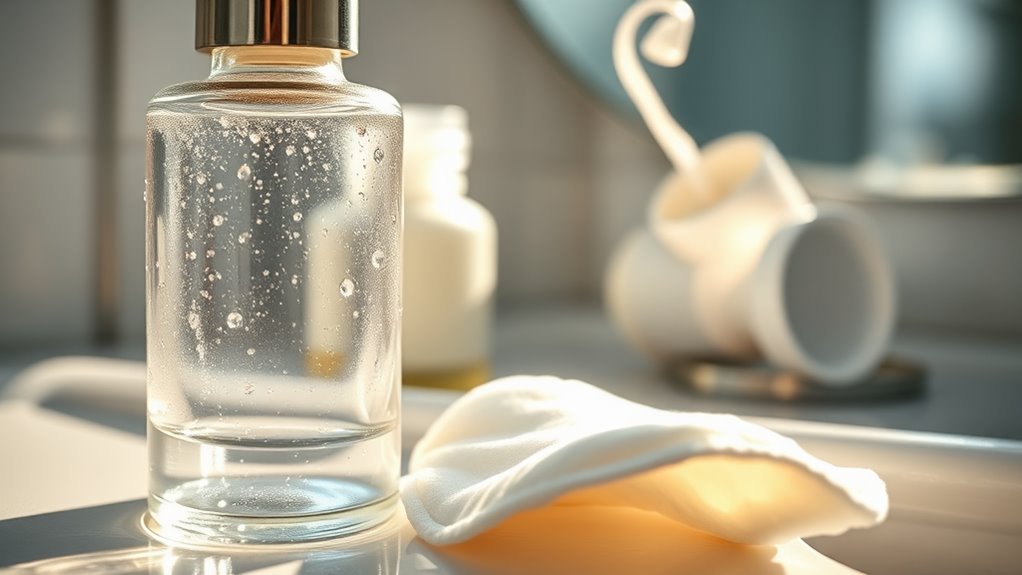These Morning Mistakes Could Be Ruining Your Skin
You might be unknowingly sabotaging your skin each morning with common mistakes. Skipping your cleanser can leave oils and impurities to clog your pores, while overusing exfoliants can damage your skin barrier. Neglecting sunscreen exposes your skin to harmful UV rays, accelerating aging. Each of these errors plays a significant role in your skin’s health. Understanding these pitfalls is crucial for achieving a radiant complexion. What other factors could be impacting your skin’s appearance?
Key Takeaways
- Skipping the cleanser allows overnight oils and impurities to clog pores, leading to breakouts and skin irritation.
- Overusing exfoliants can damage the skin barrier and cause redness, so limit use to 1-2 times per week.
- Neglecting sunscreen increases the risk of premature aging and skin cancer; always apply it for protection against UVA and UVB rays.
- Applying skincare products in the wrong order disrupts their effectiveness; start with cleanser and end with sunscreen.
- Ignoring hydration needs results in dullness and fine lines; adjust your routine seasonally for optimal skin moisture.
Skipping the Cleanser
How often do you skip your morning cleanser?
It might seem harmless, but skipping this critical step can lead to significant morning skincare mistakes.
Overnight, your skin accumulates oils, sweat, and environmental pollutants that can clog pores and cause breakouts.
A gentle cleanser helps remove these impurities, preparing your skin for subsequent products.
Neglecting this step can disrupt your skin’s natural barrier, leading to irritation and dryness.
Additionally, without proper cleansing, your moisturizer and sunscreen may not perform effectively.
Prioritizing your morning cleanser is essential for maintaining healthy skin and optimizing the benefits of your skincare routine. Furthermore, avoiding this critical step can diminish your skin’s overall health, making it more susceptible to various issues.
Overusing Exfoliants
Overusing exfoliants can significantly compromise your skin barrier, leading to irritation and redness.
When you exfoliate too frequently, you risk stripping away essential oils and damaging the protective layer of your skin.
It’s crucial to find the right balance in timing and frequency to maintain healthy, vibrant skin. Additionally, understanding the concept of refine exfoliation can help you tailor your routine for optimal results.
Skin Barrier Damage
Are you aware that frequent exfoliation can compromise your skin barrier?
Overusing exfoliants strips away essential lipids and proteins, weakening your skin’s natural defense mechanisms.
This disruption allows environmental aggressors to penetrate more easily, increasing the risk of moisture loss and vulnerability to irritants.
Your skin barrier functions as a protective shield, maintaining hydration and overall skin health.
When it’s damaged, you may experience increased sensitivity, dryness, and a higher likelihood of developing other skin issues.
To maintain a healthy barrier, limit exfoliation to once or twice a week, and focus on gentle, hydrating products that support skin recovery.
Irritation and Redness
Frequent exfoliation can lead to irritation and redness, which are clear signs your skin is overstressed.
Overusing exfoliants disrupts your skin’s natural barrier and can trigger inflammation.
To protect your skin, consider the following:
- Limit exfoliation: Stick to 1-2 times per week for physical or chemical exfoliants.
- Choose gentle products: Opt for mild formulas that contain soothing agents like aloe or chamomile.
- Monitor your skin: Pay attention to how your skin reacts; if you notice redness or sensitivity, reduce frequency immediately.
Taking these steps can help maintain your skin’s health and prevent unnecessary irritation.
Frequency and Timing
How often you exfoliate and the timing of your treatments can significantly impact your skin’s health.
Overusing exfoliants can strip your skin of essential oils, leading to irritation, sensitivity, and even breakouts.
Ideally, you should exfoliate 1-3 times a week, depending on your skin type and the exfoliant’s potency.
If you’re using a chemical exfoliant, consider applying it at night, allowing your skin to recover overnight.
Pay attention to your skin’s response; if you notice redness or excessive dryness, reduce the frequency.
Timing and moderation are key to maintaining a balanced, healthy complexion without compromising your skin’s barrier.
Neglecting Sunscreen
Neglecting this crucial step can lead to serious skin issues, including premature aging and increased cancer risk. Sun exposure damages collagen and elastin, vital for skin’s elasticity. Here are three reasons you should never skip sunscreen:
-
UV Protection: Shields against harmful UVA and UVB rays.
-
Preventing Hyperpigmentation: Reduces the risk of dark spots and uneven skin tone.
-
Moisture Retention: Many formulations hydrate, adding an extra layer of defense.
Incorporating sunscreen daily ensures your skin stays healthy and youthful over time. Additionally, adopting a simple morning routine can significantly enhance the overall effectiveness of your skincare regimen. Don’t overlook this essential step!
Applying Products in the Wrong Order
Are you sure you’re applying your skincare products in the right order?
The sequence of application significantly impacts absorption and efficacy.
Start with a cleanser to remove impurities, then apply toners to balance pH levels.
Follow with serums, which deliver concentrated active ingredients directly into your skin.
Moisturizers lock in hydration, while sunscreen should always be the final step to protect against UV damage.
Applying products out of order can hinder their benefits, leading to less effective results. Additionally, using certain combinations can diminish effectiveness or cause adverse reactions, further compromising your skincare routine.
Using Hot Water for Washing
When it comes to washing your face, have you considered the temperature of the water you’re using?
Hot water might feel refreshing, but it can strip your skin of essential oils, leading to dryness and irritation.
Your skin’s protective barrier can become compromised, resulting in various skin issues. Additionally, using hot water can interfere with double cleansing techniques, making it harder to effectively remove impurities without causing irritation.
Instead, opt for lukewarm water to maintain hydration and balance.
Here are three reasons to avoid hot water:
- Increased redness: Hot water can cause inflammation and exacerbate conditions like rosacea.
- Dryness: It can dehydrate your skin, making it feel tight and flaky.
- Impaired barrier function: Hot water disrupts the skin’s natural lipid layer.
Ignoring Hydration
How often do you think about hydration as part of your morning routine?
Ignoring hydration can significantly impact your skin’s health. Water is essential for maintaining skin elasticity and preventing dryness.
When you wake up, your body may be slightly dehydrated after a night’s sleep, leading to dull skin and increased visibility of fine lines.
Incorporating a glass of water into your morning routine can rejuvenate your skin and enhance its overall appearance.
Additionally, consider using a hydrating serum or moisturizer to lock in moisture. Skipping moisturizer for just a week can lead to decreased skin hydration and a rougher texture.
Prioritizing hydration is crucial for achieving a radiant, youthful complexion. Don’t overlook its importance.
Not Updating Your Routine Seasonally
Hydration is just one aspect of your morning skincare routine that can impact your skin’s health.
As seasons change, so do your skin’s needs.
Failing to update your routine accordingly can lead to dryness, irritation, or breakouts.
To optimize your skincare, consider these adjustments:
- Switch to a thicker moisturizer in winter to combat dryness.
- Incorporate lightweight, oil-free products in summer to prevent clogging pores.
- Add serums with antioxidants in spring to protect against environmental stressors.
Additionally, seasonal skincare adjustments are crucial to maintaining healthy, glowing skin throughout the year.

